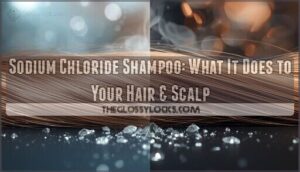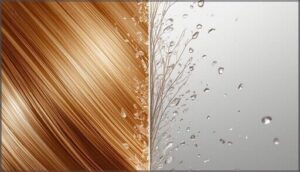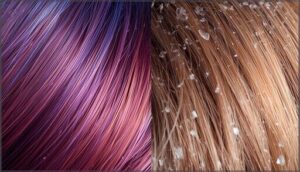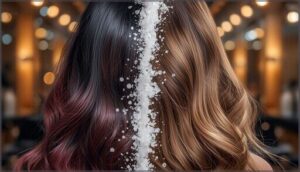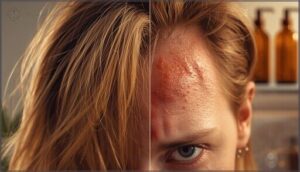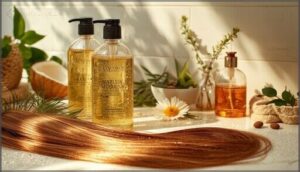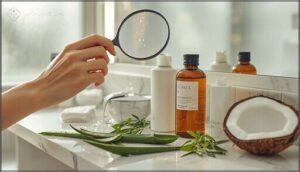This site is supported by our readers. We may earn a commission, at no cost to you, if you purchase through links.
You probably don’t think twice about table salt in your shampoo, but that’s exactly what sodium chloride is—and it’s doing more than just thickening the formula. Brands love it because it’s cheap and keeps their product looking luxurious on the shelf.
But here’s the catch: while sodium chloride makes shampoo feel thick and premium, it can strip your hair of natural oils, rough up your cuticles, and even sabotage expensive color treatments or keratin work. If you’ve been battling dryness, breakage, or mysterious scalp irritation, the culprit might be hiding in plain sight on your ingredient label.
Understanding what this common additive actually does to your hair helps you make smarter choices—especially if your current routine isn’t delivering the results you want.
Table Of Contents
- Key Takeaways
- What is Sodium Chloride Shampoo?
- How Sodium Chloride Affects Hair Health
- Risks of Sodium Chloride for Scalp and Hair
- Sodium Chloride and Hair Treatments
- Who Should Avoid Sodium Chloride Shampoos?
- Healthier Alternatives to Sodium Chloride
- How to Choose The Right Shampoo
- Frequently Asked Questions (FAQs)
- Conclusion
Key Takeaways
- Sodium chloride (table salt) is added to shampoos as a cheap thickening agent, but it strips natural oils, roughens cuticles, and accelerates moisture loss—leaving hair dry, brittle, and prone to breakage over time.
- Salt-based formulas sabotage color treatments and keratin services by lifting cuticles and destabilizing bonds, causing pigment fade within weeks and reversing expensive smoothing treatments in as little as 72 hours.
- People with sensitive scalps, color-treated hair, or chemically processed strands should avoid sodium chloride shampoos entirely, as the ingredient worsens irritation, increases porosity, and compounds existing damage.
- Plant-based thickeners like xanthan gum and guar gum, along with sulfate-free and pH-balanced formulas, offer gentler alternatives that maintain viscosity without stripping hair or disrupting scalp health.
What is Sodium Chloride Shampoo?
You’ve probably seen “sodium chloride” on a shampoo label and wondered what it actually is. Spoiler: it’s just table salt, and it’s doing more than you think in that bottle.
Let’s break down what sodium chloride really is, why manufacturers add it to your shampoo, and how common this ingredient actually is in the products lining store shelves.
If you’ve recently had a keratin treatment, choosing a sulfate-free shampoo for keratin-treated hair means you’ll also want to avoid sodium chloride, which can strip the treatment just as quickly.
Definition and Common Uses
Sodium chloride—yes, table salt—shows up in your shampoo as a thickening agent. It adjusts the product’s viscosity, giving it that thick, luxurious feel you’re used to.
You’ll find it listed on ingredient decks across drugstore and mass-market brands. It’s simple, cost-effective, and helps stabilize the formula by suspending particles that would otherwise settle out.
The use of such additives can be evaluated using scientific study methods to verify their safety and effectiveness.
Why Sodium Chloride is Added to Shampoo
But why is it even there? Salt comes cheap—manufacturers can cut production costs without investing in pricier thickening agents. Here’s what it does behind the scenes:
- Controls viscosity by tweaking surfactant interactions
- Enhances rheology during manufacturing for easier processing
- Stabilizes formulas by managing phase separation
- Replaces costlier polymers while maintaining shampoo texture
Salt concentration matters. Too much can backfire on your hair. Understanding the language patterns is essential for effective communication about these effects.
Prevalence in Commercial Hair Products
You’ll find it everywhere—most supermarket shampoos rely on sodium chloride to save money. Industry surveys confirm it’s in the majority of mainstream brands. Regulatory labeling data show sodium chloride ranks among the top 20 shampoo ingredients by weight. From budget to premium lines, commercial formulations use it across price tiers.
If you’re dealing with sensitivity after dyeing, consider exploring gentle hair color alternatives designed for sensitive scalps that skip harsh additives like excess salt.
Hair product regulations require accurate ingredient disclosure, so you can check labels. Mass market trends favor salt because it’s inexpensive and manufacturing-friendly. Sodium chloride concentration varies, but cosmetic ingredients like this dominate hair care products. Understanding industry standards compliance helps you spot what’s really in your shampoo.
| Market Segment | Sodium Chloride Presence |
|---|---|
| Budget shampoos | Very common |
| Mid-tier brands | Frequently included |
| Premium lines | Often present |
| Sulfate-free alternatives | Less common |
| European/North American markets | High inclusion rate |
How Sodium Chloride Affects Hair Health
Salt doesn’t just make your shampoo thick and creamy—it actually changes what happens to your hair every time you wash.
From drying out your strands to breaking down color treatments, sodium chloride affects your hair in ways most people don’t realize.
Here’s what you need to know about how it works.
Stripping Natural Oils
Think of your scalp’s natural oils as a protective shield. When sodium chloride amps up shampoo viscosity, the oil stripping mechanism goes into overdrive.
Over time, this disrupts your scalp’s pH balance and weakens follicles—though antioxidant-rich treatments like açaí can help counteract some of that inflammatory damage.
Sodium chloride ramps up oil stripping, tearing through your scalp’s protective barrier with every wash
You’re left with lipid loss effects that increase hair porosity and compromise natural moisture barriers. The sebum removal process speeds up, pulling away the very protection your hair needs.
Over time, this cycle weakens your hair’s defenses—so choosing nutrient-rich foods that support beard health becomes essential to rebuilding what’s been stripped away.
Over time, this leads to real hair damage and scalp irritation.
Impact on Hair Texture and Strength
Your hair’s resilience takes a hit with every salt-heavy wash. Sodium chloride shampoo ingredients disrupt cuticle integrity, bumping up porosity increase and making strands feel rough or brittle.
Over time, hair texture shifts from smooth to straw-like, while hair fiber damage chips away at tensile strength. The result? Hair strength loss that’s especially noticeable if you’ve already bleached or chemically treated your locks.
Effects on Color-Treated Hair
Dyed hair faces a triple threat from sodium chloride shampoo. Salt damage accelerates problems you’ve already introduced through coloring:
- Color fade speeds up as salt lifts cuticles, letting pigment molecules escape with each wash—semi-permanent dyes vanish fastest
- Hair porosity climbs when sodium chloride disrupts your strand’s protective layer, killing shine and inviting frizz
- Dye stability tanks because salt interferes with color retention, especially in fashion shades and keratin-smoothed colortreated hair
Risks of Sodium Chloride for Scalp and Hair
You already know sodium chloride can mess with your hair’s texture and strength. But the real trouble shows up on your scalp and along each strand over time.
Let’s break down the three biggest risks you’re facing when this ingredient becomes a regular part of your routine.
Dryness and Itchiness
Ever wonder why your scalp feels tight after washing? Sodium chloride pulls moisture away, increasing water loss on your scalp. You might notice flaking, itchiness, or that tight-skin sensation—especially if you have scalp sensitivity or conditions like dermatitis.
The irritation disrupts your hair moisture balance and scalp health.
Switch to sulfate-free, hydrating formulas with ceramides or glycerin for itch relief and gentler cleansing.
Hair Loss and Breakage
Sodium chloride doesn’t directly cause permanent hair loss—but it sets the stage for breakage that mimics it. By stripping your hair’s natural oils, it reduces lubrication and weakens cuticle integrity, leading to hair shedding and follicle damage over time.
- Scalp inflammation from repeated exposure weakens follicle strength
- Cuticle disruption from drying effects increases mechanical stress
- Hair breakage accelerates when combined with color treatments
- Sodium chloride compounds damage from over-brushing or heat styling
- Reversible hair shedding may occur with environmental stressors
Support scalp health with hydrating, salt-free formulas to prevent ongoing hair damage and repair weakened strands.
Scalp Irritation and Sensitivity
If you’re prone to sensitive skin, salt-based shampoos can trigger irritant reactions like redness, burning, and persistent itch. Sodium chloride disrupts scalp pH balance, compromising your skin’s protective barrier and worsening dryness.
Shampoo ingredients and effects matter—especially when preexisting conditions like eczema are present. Prioritize scalp health and irritation prevention with gentle, salt-free formulas that support dryness management and itch relief instead of undermining scalp health.
Sodium Chloride and Hair Treatments
If you’ve invested in salon treatments, you need to know this. Sodium chloride can seriously interfere with keratin services, color work, and chemical treatments—sometimes undoing what you just paid for.
Here’s what happens when salt-based shampoos meet professionally treated hair.
Interference With Keratin Treatments
You spent hundreds on that keratin treatment—don’t let sodium chloride shampoo ruin it. Salt damage happens fast, weakening keratin bonding and accelerating hair rebound. Here’s what chloride interference does:
- Strips protective layers within 72 hours, inviting frizz back
- Raises hair porosity, causing moisture loss and styling damage
- Disrupts treatment longevity by destabilizing smoothed bonds
- Undermines your investment in salon-quality hair health
Switch to chloride-free formulas immediately post-treatment.
Fading of Chemical and Color Treatments
Your color vibrancy disappears faster when sodium chloride lifts the cuticle and lets dye molecules escape. That’s chemical processing meeting sodium chloride: a recipe for faded brilliance. Semi-permanent shades vanish within weeks, while permanent treatments lose punch from repeated chloride exposure.
| Treatment Type | Fading Timeline | Chloride Impact |
|---|---|---|
| Semi-permanent dye | 2–6 weeks | Speeds up color loss markedly |
| Permanent color | 4–8 weeks | Weakens dye bonds, dulls vibrancy |
| Keratin + color combo | 3–6 weeks | Strips both protein and pigment layers |
| Balayage/highlights | 6–10 weeks | Roughens cuticle, causes uneven fade |
Switch to pH-balanced, sulfate-free formulas to protect your investment and prevent hair damage.
Suitability for Processed or Treated Hair
If you’ve already spent money on keratin or color, here’s what you need to know: your treated hair’s weakened structure makes it extra vulnerable to sodium chloride’s harsh effects. Chemical processing leaves strands porous and fragile, so salt-based shampoos accelerate moisture loss, color fade, and hair damage.
5 Signs Salt-Based Formulas Don’t Suit Your Processed Hair:
- Your keratin smoothing reverses within 2–4 weeks instead of lasting months
- Scalp sensitivity flares up with stinging or tightness after each wash
- Color fade happens unevenly, creating patchy or brassy tones faster than expected
- Breakage increases along previously treated sections showing structural weakness
- Frizz returns aggressively despite using anti-humidity products between salon visits
Switching to treated haircare formulas without sodium chloride protects your investment. Sulfate-free, pH-balanced options support hair health and growth while preserving the results you paid for—no more watching your hair care and maintenance dollars wash down the drain.
Who Should Avoid Sodium Chloride Shampoos?
Not everyone needs to sweat the sodium chloride in their shampoo. But if your hair’s been through the wringer—or your scalp throws a fit at the slightest provocation—this ingredient might be working against you.
Here’s who should think twice before reaching for that salt-thickened bottle.
People With Sensitive Scalps
If you’ve got a sensitive scalp, sodium chloride shampoos can feel like sandpaper on sunburn. Salt draws moisture from your skin, disrupting your scalp’s natural barrier and triggering stinging, flaking, or relentless itch.
Scalp sensitivity demands gentle formulas with soothing ingredients like aloe or colloidal oatmeal—not harsh shampoo ingredients that compound irritation. Your scalp health deserves better than salt-loaded shortcuts.
Individuals With Damaged or Color-Treated Hair
Damaged hair already has sky-high hair porosity—salt makes it worse. Sodium chloride accelerates color fade, intensifies cuticle damage, and worsens moisture loss in weakened strands. Your hair care routine shouldn’t sabotage hair growth or chemical-free living goals.
- Breakage risk spikes when salt compounds protein keratin damage
- Color-treated hair loses pigment faster with high-salt formulas
- Tangling and frizz increase as cuticles swell and disrupt
Users Seeking Moisture or Hair Repair
Moisture balance is your first priority—skip the salt. Sodium chloride pulls hydration away from dry hair when you need gentle cleansing and scalp soothing instead.
Natural repair requires humectants like glycerin, not harsh minerals that sabotage hair growth. Your hair care routine should restore hair hydration, not strip it.
Salt-free formulas deliver the moisture balance essential for hair damage prevention.
Healthier Alternatives to Sodium Chloride
You don’t have to settle for shampoos that dry out your hair and scalp. There are smarter thickening agents and formulation strategies that won’t strip your strands or mess with your treatments.
Here’s what to look for when you’re ready to make the switch.
Plant-Based Thickeners (Xanthan, Guar Gum)
If you’re looking to skip sodium chloride without sacrificing a creamy lather, natural thickeners offer a gentler path forward. Plant-based alternatives like xanthan gum and guar gum create luxurious viscosity in shampoo formulations, letting you enjoy:
- Eco-friendly options derived from fermentation and guar beans
- Stable texture that holds up across different water conditions
- Improved slip and spreadability for easier rinsing
- Compatible formulations that work alongside natural ingredients
- Clean-label appeal without synthetic polymers
These thickeners deliver the consistency you want while respecting your hair care goals.
Sulfate-Free and Hydrating Formulas
If your scalp craves comfort without the harshness of sulfates or sodium chloride, gentle cleansers are your answer. Sulfate-free formulas skip SLS and SLES, letting you maintain moisture balance while supporting hair repair. They rely on natural thickeners like glycerin and 1,2-alkanediol to deliver scalp comfort and effective hair care—no compromise necessary.
| Feature | Traditional Shampoo | Sulfate-Free Formula |
|---|---|---|
| Cleansing Agents | SLS/SLES + Sodium Chloride | Plant-based surfactants |
| Scalp Feel | Often drying, tight | Gentle, hydrated |
| Hair Texture | Stripped, rough | Soft, balanced |
PH-Balanced and EWG Verified Shampoos
Your scalp thrives when pH balance mirrors its natural acidity. PH-Balanced shampoos hover around 4.5–5.5, keeping cuticles smooth and frizz under control. EWG VERIFIED products meet strict safety standards, pairing Gentle Formulas with Natural Ingredients like citric acid.
Look for options that combine:
- Sulfate Alternatives (coco betaine, decyl glucoside)
- Transparent ingredient disclosure
- Eco Friendly Options without Sodium Chloride
- Third-party verification for Scalp Health and Irritation prevention
How to Choose The Right Shampoo
Now that you know what to avoid, it’s time to get smart about what you’re actually buying. The shampoo aisle is full of labels that sound impressive but don’t always tell the whole story.
Here’s how to cut through the marketing noise and find a formula that works for your hair.
Recognizing Marketing Claims About Salt Content
You’ll see “salt-free” or “natural salt infusion” plastered on shampoo bottles—but what does that really mean? Verify the ingredient disclosure: check if sodium chloride appears on the label and where.
Consumer guidance often lacks specifics, so compare salt content claims across brands. Marketing regulations require accurate labeling, but vague language can mislead.
Don’t let beauty and cosmetics jargon distract you from the hair care facts.
Prioritizing Scalp Comfort and Hair Goals
What matters most to you—calming an itchy scalp or locking in moisture? Choose shampoos that balance gentle cleansing with hair hydration and pH balance.
Low-sodium, sulfate-free formulas protect scalp health and boost moisture retention without the drying effects of sodium chloride.
If you’re battling scalp sensitivity or worried about hair loss, prioritize products with humectants and conditioning polymers high on the ingredient list.
Frequently Asked Questions (FAQs)
How much sodium chloride is typically in shampoo?
Most mainstream shampoos contain 5% to 2% sodium chloride by weight. Budget formulas sometimes push toward 3%, while sulfate-free or premium products often skip salt entirely or stay under 1%.
Are sodium chloride shampoos safe for childrens hair?
Most sodium chloride shampoos won’t cause serious harm, but they can dry out delicate pediatric hair care routines.
Salt-free alternatives offer gentle cleansing that protects child scalp health without stripping natural oils.
Conclusion
Think of sodium chloride shampoo as a borrowed luxury—it delivers instant thickness, but your hair pays the price later. If you’re dealing with dryness, breakage, or treatments that won’t hold, it’s time to read those labels differently.
Your scalp and strands deserve formulas that support long-term health, not just shelf appeal. Switch to plant-based thickeners and sulfate-free options that actually nourish what they touch. Real quality doesn’t need shortcuts.
- https://x.com/godofprompt/status/1990526288063324577
- https://www.sciencedirect.com/science/article/pii/S0749208123000268
- https://www.reddit.com/r/PromptEngineering/comments/1jsy9vh/id_like_some_feedback_on_this_prompt_aimed_at/
- https://www.scribd.com/document/910882013/HOW-TO-WRITE-A-RESEARCH-ARTICLE-A-STRUCTURED-APPRO
- https://www.onelook.com/?loc=olthes1&w=subpoint

